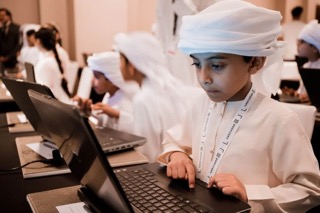
Interview: Andrew Wolhuter: AI in Leadership Development

Andrew Wolhuter is a recognized authority in Learning and Development. With a keen interest in technology’s role in learning and development, Andrew’s ultimate mission is to create high-performance teams that contribute to the business’s growth and success, making a lasting impact in the industry.
Presenting on AI’s Rising Impact on Leadership Development at the 5th HR and People Development Summit in Dubai in February we thought we’d get his take on AI in the Industry.
Do you think AI has already affected learning & development in companies and how so?
Yes, I do for 2 reasons, companies that have a digital learning platform can use AI to their advantage by keeping learners in a perpetual state of bespoke learning.
Gone are the days when LMS’ were used to push learning and monitor for completion.
With so many vendors in the market with large amounts of content libraries aggregated from different e-learning providers, AI can be used to recommend learning based on data points learned from the user. These parameters can include length of time spent on learning, content interaction engagement rates, skill assessments etc. This allows learning journeys to remain consistent for the learner and encourages them to come back to any platform as they are guaranteed a unique experience based on any company’s learning objectives.
The 2nd reason is that learning and development practitioners should always have a ‘seat at the table’ and fare well in conversations with subject matter experts from all departments to better recommend or administer learning solutions. AI language models are able to assist with that when attempting to consult as a business partner to a different department through ‘need to know’ crash courses, this is dependent on the prompts used within AI. Staying with the sentiment of providing better solutions, the tools with which learning and development can ‘pitch’ those solutions allow for faster design. If learning and development leaders use AI effectively, it gives them an edge within a business because if they understand it, they can show other business leaders and employees that the unknown may not be as scary as they initially thought.
If AI is used effectively, how will this effect coaching and mentoring in companies?
Not only effectively, but the key word is also ethical.
It’s important to remember who trains these AI models and what the objective of the AI model used for coaching is. If ethical, coaching and mentoring can be moved to within the flow of work for employees providing a seamless experience that can leave the ‘coachee’ feeling motivated within shorter spaces of time.
If the AI Model used for coaching and mentoring is mirrored off of micro-entry gratitude applications currently on the market, the AI can have workflows set up that prompt entries from the ‘coachee’ and this can make for constant reflection which forms a major part of any coaching practice. Part of a coach’s training is to ensure that they hold no bias to certain aspects of their clients, this can be attained within the realm of AI.
Coaching is provided on time, and consistently goals set in coaching sessions can be interfaced with performance management systems as well as employee well-being or engagement platforms. Coachees can be held accountable for their goals set within AI that are prompted to follow up.
Overall, if effective and ethical, with set guidelines, company values, and vocabulary, AI coaching and mentoring would be exceptionally beneficial for companies for employee performance and engagement but may affect culture which I will outline below.
Are there any negatives to this?
Yes, culture.
People don’t leave companies, they leave managers.
Managers or leaders have their styles and are responsible for creating the culture of their greater teams. If coaching is not managed well, or AI models are not updated we risk losing out on human connection.
Coaching should not only be used through an AI language model, it should also include manager interventions. The problem with this is it could potentially add to the workloads of managers who have to see what the update of their team member’s coaching is before their coaching session. With time already a resource most managers complain of not having, this could lead to abandoning the AI language model and defaulting back to regular one-on-ones.
It’s about striking a balance between in-person follow-ups and AI prompts and interpretation. Both coach and coachee must be accountable for the results set out in initial coaching meetings and to what extent an AI model will be used to coach.
Looking to 2024, what innovations will AI bring to learning & development, particularly coaching employees.
I anticipate that 2024 will bring insight into aspects of our work that previously would take much longer to gain.
When coaching individuals, AI language models are trained on vast amounts of academic journals and data. When dealing with the complexity of our unique human experience, answers, guidelines, and suggestions that are researched are far easier to attain. I also predict that coaching over-all will become an elevated experience and something that will be far more embraced than what it is currently because AI language models do not become ‘frustrated’ when someone is not able to learn something, creating a more cohesive environment for the coachee to learn, but for the AI to further train too.
Hear Andrew speak at the 5th HR and People Development Summit Dubai on the 7th-8th February.
Click Here: https://summit-events.com/hrpddub-dubai#register-interest

 EN
EN AR
AR HI
HI ES
ES FR
FR DE
DE











